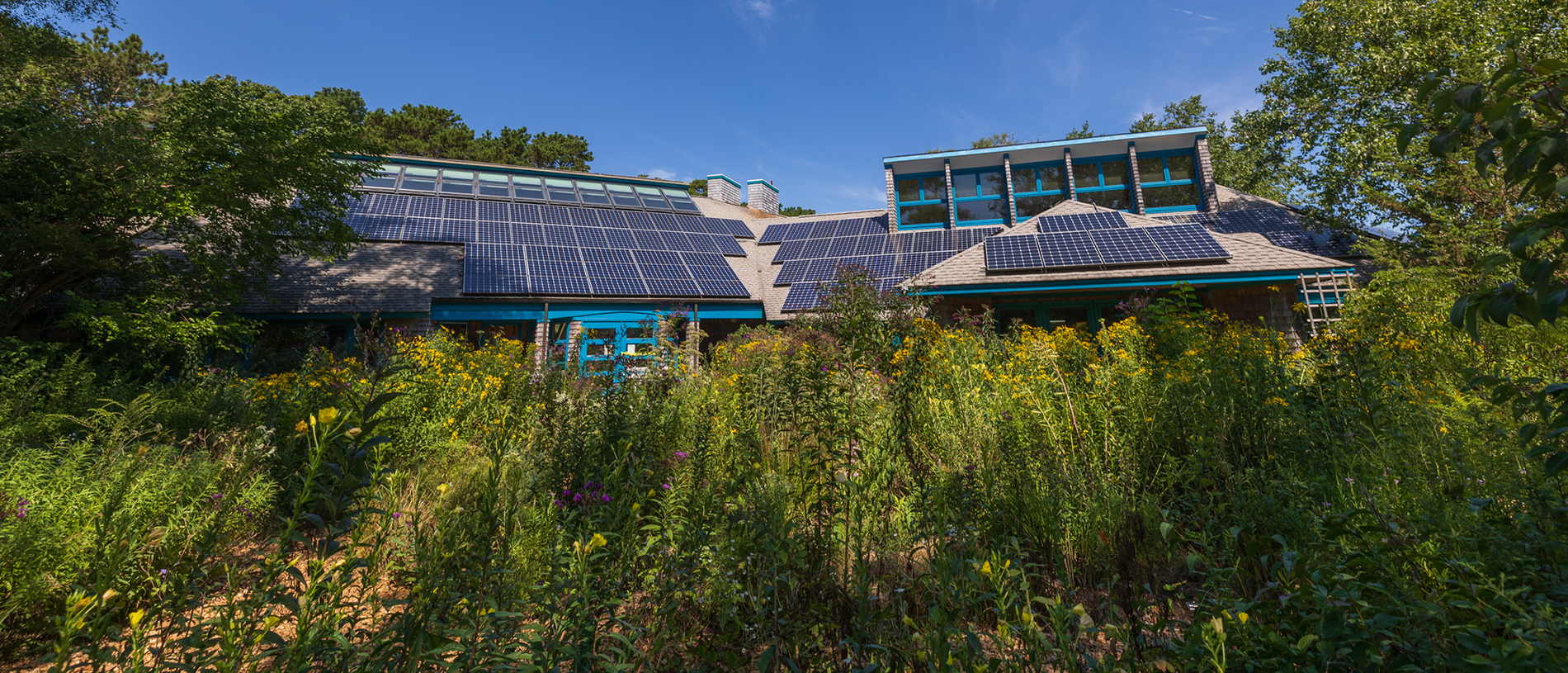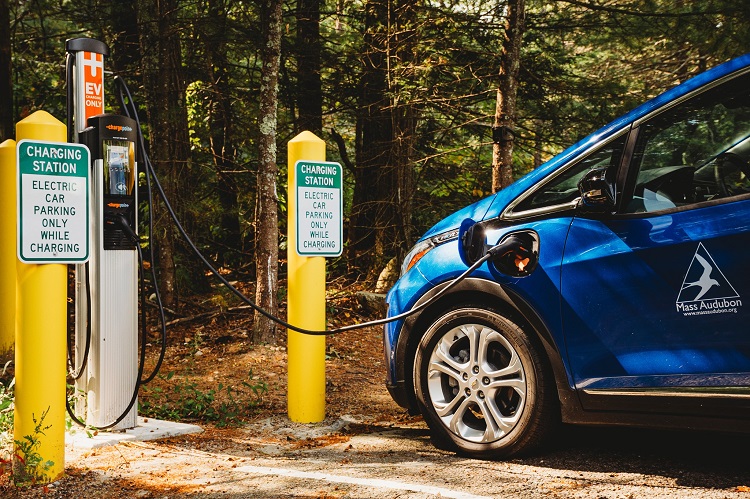Leading By Example
At Mass Audubon, we're taking steps to do our part and reduce our carbon emissions from fossil fuel consumption. By installing or upgrading a wide variety of green features at our wildlife sanctuaries, Mass Audubon has reduced its annual carbon footprint by almost 50% since 2003.
Energy
Mass Audubon has worked to make our buildings more energy efficient by not only auditing and replacing natural gas, propane, and heating oil consuming appliances, but also increasing our usage of renewable energy.
At all of our sanctuaries with nature centers, we generate electricity by using photovoltaic arrays, which harness energy from the sun. These arrays are both helping us to reduce our carbon footprint and serve as demonstration models for visitors. Track how these arrays are working
What we can't generate ourselves, we purchase from our partner, Green Energy Consumers Alliance (GECA).
Transportation
Transportation is the single largest source of greenhouse gas emissions in Massachusetts. Mass Audubon is addressing this internally by replacing our sedans in our vehicle fleet with more efficient Prius hybrids and electric vehicles.
We've also installed electric vehicle charging stations at several of our wildlife sanctuaries.
Where to Charge Up
Four Level 2 J1772 connector plugs that are compatible with all makes and models of EV (Tesla owners may need to use an adapter to connect their vehicle).
Each plug provides about 25 miles for every hour of charging time
ChargePoint Network
$0.28 per kWh
Four Level 2 J1772 connector plugs that are compatible with all makes and models of EV (Tesla owners may need to use an adapter to connect their vehicle).
Each plug provides about 25 miles for every hour of charging time
ChargePoint Network
$0.28 per kWh
Four Level 2 J1772 connector plugs that are compatible with all makes and models of EV (Tesla owners may need to use an adapter to connect their vehicle).
Each plug provides about 25 miles for every hour of charging time
ChargePoint Network
$0.28 per kWh
Two Level 2 J1772 connector plugs that are compatible with all makes and models of EV (Tesla owners may need to use an adapter to connect their vehicle).
Each plug provides about 25 miles for every hour of charging time
Free (Donation requested)
Two Level 2 J1772 connector plugs that are compatible with all makes and models of EV (Tesla owners may need to use an adapter to connect their vehicle).
Each plug provides about 25 miles for every hour of charging time
ChargePoint Network
$0.28 per kWh
Four Level 2 J1772 connector plugs that are compatible with all makes and models of EV (Tesla owners may need to use an adapter to connect their vehicle).
Each plug provides about 25 miles for every hour of charging time
ChargePoint Network
$0.28 per kWh
Two Level 2 J1772 connector plugs that are compatible with all makes and models of EV (Tesla owners may need to use an adapter to connect their vehicle).
Each plug provides about 25 miles for every hour of charging time
Free (Donation requested)
Two Level 2 J1772 connector plugs that are compatible with all makes and models of EV (Tesla owners may need to use an adapter to connect their vehicle).
Each plug provides about 25 miles for every hour of charging time
ChargePoint Network
$0.28 per kWh
Two Level 2 J1772 connector plugs that are compatible with all makes and models of EV (Tesla owners may need to use an adapter to connect their vehicle).
Each plug provides about 25 miles for every hour of charging time
ChargePoint Network
$0.28 per kWh
Two Level 2 J1772 connector plugs that are compatible with all makes and models of EV (Tesla owners may need to use an adapter to connect their vehicle).
Each plug provides about 25 miles for every hour of charging time
ChargePoint Network
$0.28 per kWh
Two Level 2 J1772 connector plugs that are compatible with all makes and models of EV (Tesla owners may need to use an adapter to connect their vehicle).
Each plug provides about 25 miles for every hour of charging time
ChargePoint Network
$0.28 per kWh
Two Level 2 J1772 connector plugs that are compatible with all makes and models of EV (Tesla owners may need to use an adapter to connect their vehicle).
Each plug provides about 25 miles for every hour of charging time
ChargePoint Network
$0.28 per kWh
Two Level 2 J1772 connector plugs that are compatible with all makes and models of EV (Tesla owners may need to use an adapter to connect their vehicle).
Each plug provides about 25 miles for every hour of charging time
ChargePoint Network
$0.28 per kWh
Two Level 2 J1772 connector plugs that are compatible with all makes and models of EV (Tesla owners may need to use an adapter to connect their vehicle).
Each plug provides about 25 miles for every hour of charging time
ChargePoint Network
$0.28 per kWh
Two Level 2 J1772 connector plugs that are compatible with all makes and models of EV (Tesla owners may need to use an adapter to connect their vehicle).
Each plug provides about 25 miles for every hour of charging time
ChargePoint Network
$0.28 per kWh
Two Level 2 J1772 connector plugs that are compatible with all makes and models of EV (Tesla owners may need to use an adapter to connect their vehicle).
Each plug provides about 25 miles for every hour of charging time
ChargePoint Network
$0.28 per kWh
Green Buildings
We have applied green building standards to all new buildings, building renovations, and site improvements on our properties since 2014. All of our buildings:
- Conserve energy through LED lighting, EnergyStar appliances, programmable thermostats, electric-powered grounds equipment and vehicles, when possible, and ongoing installation of heat pumps.
- Conserving water through dual-flush or composting toilets, rainwater collection systems, and water bottle filling stations.
- Use energy from renewable sources via solar panels installed at 20+ sanctuaries across the state. What we can't generate ourselves, we purchase from our partner, Green Energy Consumers Alliance (GECA).
Food, Water, & Land
We've instituted composting systems for food waste at many sites, implemented community supported agriculture (CSA) programs and community gardens, and installed rain gardens or other, innovative storm water management systems across the Commonwealth.
Our Impact
We have taking critical steps to do our part and reduce our carbon emissions from fossil fuel consumption.
-
410,000
Kilowatt-Hours of electricity generated each year from our solar arrays across the state.
-
100%
Energy Mass Audubon uses that comes from alternative fuel sources. What we don't produce, we purchase from GECA.
-
1.8 million
Estimated pounds of CO2 we have reduced from our carbon footprint since 2003.
Stay Connected
Don't miss a beat on all the ways you can get outdoors, celebrate nature, and get involved.




